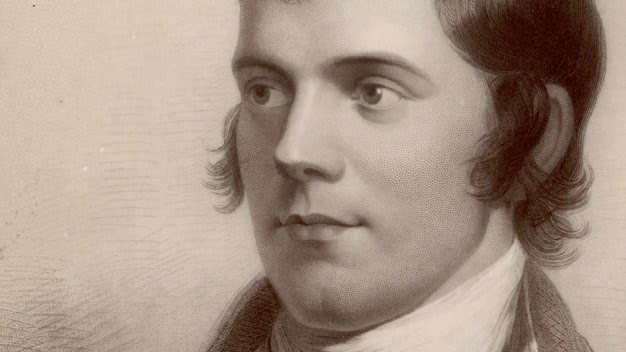 Robert Burns (25 January 1759 - 21 July 1796) was a Scottish poet and lyricist. He's regarded as the national poet of Scotland and he's celebrated worldwide. He's te best known of the poets who have written in the Scots language, but a lot of his poems was written in English and some in Scots dialet. He is regarded as a pioneer of the Romantic movement, and after his death he became a great source of inspiration to the founders of both liberalism and socialism, and a cultural icon in Scotland. As well as making original compositions, Burns also collected folk songs from across Scotland, often revising or adapting them. His poem (and song) "Auld Lang Syne" is often sung at Hogmanay (the last day of the year), and "Scots Wha Hae" served for a long time as an unofficial national anthem of the country.
Robert Burns (25 January 1759 - 21 July 1796) was a Scottish poet and lyricist. He's regarded as the national poet of Scotland and he's celebrated worldwide. He's te best known of the poets who have written in the Scots language, but a lot of his poems was written in English and some in Scots dialet. He is regarded as a pioneer of the Romantic movement, and after his death he became a great source of inspiration to the founders of both liberalism and socialism, and a cultural icon in Scotland. As well as making original compositions, Burns also collected folk songs from across Scotland, often revising or adapting them. His poem (and song) "Auld Lang Syne" is often sung at Hogmanay (the last day of the year), and "Scots Wha Hae" served for a long time as an unofficial national anthem of the country. Other poems and songs of Burns that remain well known across the world today include "A Red, Red Rose"; "A Man's a Man for A' That"; "To a Louse"; "To a Mouse"; "The Battle of Sherramuir"; "Tam o' Shanter"; and "Ae Fond Kiss".
This is the poem "A Red, Red Rose":
 O my Luve's like a red, red rose
O my Luve's like a red, red roseThat’s newly sprung in June;
O my Luve's like the melodie
That’s sweetly play'd in tune.
As fair art thou, my bonnie lass,
So deep in luve am I:
And I will luve thee still, my dear,
Till a’ the seas gang dry:
Till a’ the seas gang dry, my dear,
And the rocks melt wi’ the sun:
I will luve thee still, my dear,
While the sands o’ life shall run.
And fare thee well, my only Luve
And fare thee well, a while!
And I will come again, my Luve,
Tho’ it were ten thousand mile.
Burns suppers
Burns Night, in effect a second national day, is celebrated on Burns's birthday, 25 January, with Burns suppers around the world, and is more widely observed in Scotland than the official national day, St. Andrew's Day.
 |
| This is the haggis |
Commenti
Posta un commento